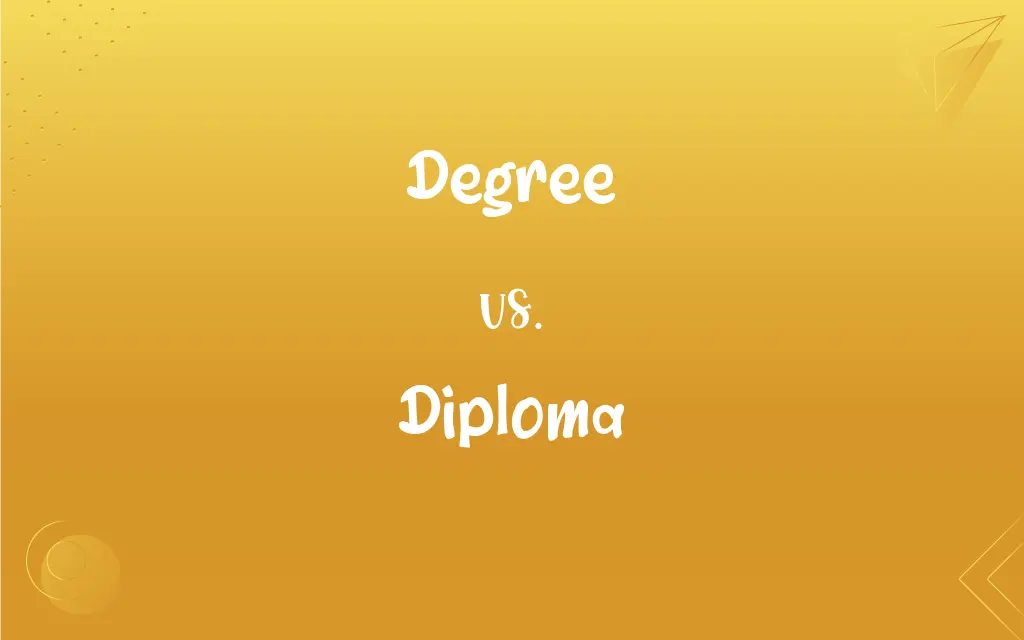Degree vs. Diploma: What's the Difference?
Edited by Aimie Carlson || By Harlon Moss || Updated on October 25, 2023
A degree is an academic qualification conferred by a university or college, while a diploma is a certificate marking the completion of a course of study.

Key Differences
A degree and a diploma, both signify the attainment of education or training, but they differ in terms of depth, duration, and the institutions that award them. A degree is a title conferred by a university or college to recognize the successful completion of an undergraduate or postgraduate program.
A diploma, conversely, is a certificate that testifies the completion of a particular course of study, often vocational or technical. These courses can be offered by high schools, colleges, technical institutions, or community colleges. While some diploma programs might be extensive, they are usually shorter than degree programs.
In terms of hierarchy and prestige, degrees are typically considered more advanced than diplomas. This distinction mainly arises from the depth and breadth of study, research components, and the duration. For instance, earning a bachelor's degree generally requires multiple years of study, encompassing various subjects, whereas a diploma might focus on a specific skill or topic and could be earned in a year or two.
Another significant difference between a degree and a diploma lies in their career implications. While both can lead to job opportunities, a degree often opens doors to higher-paying and more specialized roles. In contrast, a diploma might lead to entry-level positions or specialized fields based on the skill set acquired.
In conclusion, while both degree and diploma recognize educational achievement, they differ in duration, depth, the institutions awarding them, and their potential career outcomes.
ADVERTISEMENT
Comparison Chart
Definition
An academic qualification from a university/college
A certificate for completion of a course
Duration
Typically longer (e.g., 2-4 years for undergrad)
Generally shorter (often 1-2 years)
Depth
Comprehensive, with broader curriculum
More focused on specific skills or topics
Awarded by
Universities and colleges
High schools, colleges, technical institutions
Career Implications
Opens doors to higher-paying/specialized roles
Leads to entry-level or specialized positions
ADVERTISEMENT
Degree and Diploma Definitions
Degree
A degree can also refer to a unit of measurement for angles.
The angle is 90 degrees.
Diploma
A diploma is a certificate marking the completion of a specific course or study.
After two years of training, she received her diploma in graphic design.
Degree
A degree is a title given by a university or college after successful completion of a study program.
She earned her bachelor's degree in psychology.
Diploma
A diploma attests to the holder's skills or knowledge in a particular field.
She proudly displayed her diploma on the office wall.
Degree
Degrees are academic qualifications at various levels like bachelor's, master's, or doctorate.
He's working towards his master's degree in economics.
Diploma
Diplomas can be earned from various institutions, not just universities.
After high school, he obtained a diploma in culinary arts.
Degree
A degree indicates the completion of a specific course and often requires research or a thesis.
After four years of hard work, he finally got his degree.
Diploma
Diplomas are often awarded for vocational or technical courses.
He earned a diploma in automotive repair.
Degree
Degrees are typically classified based on their duration and depth.
She is the first in her family to pursue a doctoral degree.
Diploma
A diploma can also mean a document conferring some honor or privilege.
He was given a diploma for his outstanding contributions.
Degree
One of a series of steps in a process, course, or progression; a stage
Proceeded to the next degree of difficulty.
Diploma
A document issued by an educational institution, such as a university, testifying that the recipient has earned a degree or has successfully completed a particular course of study.
FAQs
Which typically takes longer to earn, a degree or diploma?
A degree usually takes longer to earn compared to a diploma.
What is a degree?
A degree is an academic qualification awarded by universities or colleges after completing a specific course of study.
Can community colleges award degrees?
Yes, community colleges can award associate degrees.
How is a diploma different from a degree?
A diploma is a certificate for completing a particular course, often shorter and more specialized than a degree.
Can I get a job with just a diploma?
Absolutely! Many diplomas prepare students for specific careers.
Why might someone choose a diploma over a degree?
Diplomas might be quicker, more affordable, or more aligned with specific career goals.
Are diplomas only for vocational training?
No, while many are, diplomas can also be awarded for academic courses.
Do degrees require a thesis or final project?
Often, especially at the postgraduate level.
Can I earn a diploma online?
Yes, many institutions offer online diploma programs.
Is a degree always from a university?
Mostly, but some colleges also confer degrees.
Which has a broader curriculum, a degree or a diploma?
A degree generally has a broader curriculum than a diploma.
Is a bachelor's a type of degree?
Yes, a bachelor's is an undergraduate degree.
Are all diplomas vocational?
No, some are academic, but many focus on specific skills.
Which is more recognized globally, a degree or a diploma?
Degrees are generally more recognized, but it varies based on the field and country.
Is a diploma equivalent to a certification?
Not always. While both attest to learning, diplomas are often more comprehensive than certifications.
Are online degrees considered valid?
Yes, if they are from accredited institutions.
Can diplomas lead to further studies?
Yes, some diploma holders may transition to degree programs.
Are there different levels of degrees?
Yes, such as associate, bachelor's, master's, and doctorate.
Can high schools award diplomas?
Yes, high schools award diplomas upon graduation.
How long does it typically take to earn a diploma?
It varies, but many diploma programs last 1-2 years.
About Author
Written by
Harlon MossHarlon is a seasoned quality moderator and accomplished content writer for Difference Wiki. An alumnus of the prestigious University of California, he earned his degree in Computer Science. Leveraging his academic background, Harlon brings a meticulous and informed perspective to his work, ensuring content accuracy and excellence.
Edited by
Aimie CarlsonAimie Carlson, holding a master's degree in English literature, is a fervent English language enthusiast. She lends her writing talents to Difference Wiki, a prominent website that specializes in comparisons, offering readers insightful analyses that both captivate and inform.
































































